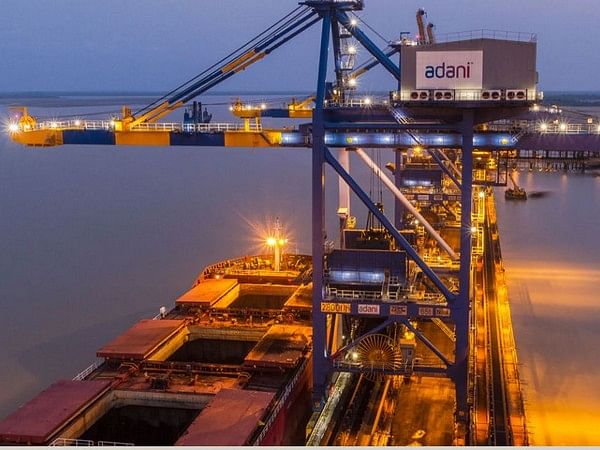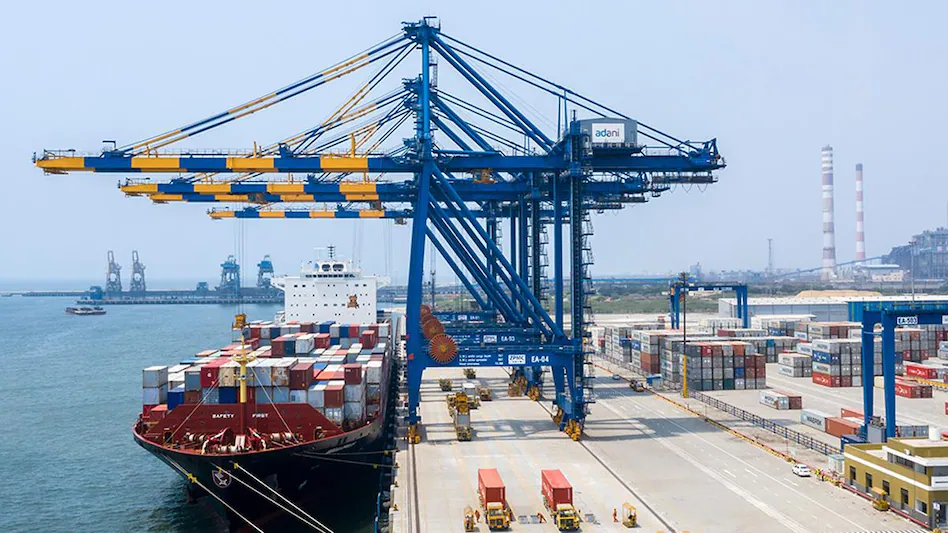Acquisition of Gangavaram Port: NCLT approves Adani Ports

The National Company Law Tribunal ( NCLT) has given its concurrence for Adani Port and Special Economic Zone Ltd to buy the last 58.1 percent interest in Gangavaram Port, the country’s largest harborage and logistics company.
According to a non-supervisory form to the stock requests, Adani Port and Special Economic Zone Ltd. have got concurrence from NCLT Ahmedabad and NCLT Hyderabad to buy the remaining 58.1 shares in Gangavaram Port Limited( GPL) under the compound scheme of the arrangement. Following this equity sale, GPL will become a wholly owned attachment of Adani Port and Special Economic Zone Ltd. ( APSEZ).

“The accession of GPL is an important step in icing our position as India’s premier transportation mileage and achieving East-West equality.” Gangavaram Port, which has good rail and road connections, serves as a marketable entry point to the eight-state outback. According to Karan Adani, CEO and Whole-Time Director of APSEZ, the lately erected vessel handling installation will allow us to increase weight volumes more snappily. Also, APSEZ offers top-notch logistical solidarity that would help Gangavaram Port reach a maximum weight capacity of 250 MMT.
According to Karan Adani, this will quicken Andhra Pradesh’s industrialization. In the northern part of Andhra Pradesh, Gangavaram Port is located next to Vizag Port. It’s the third largest non-major harborage in Andhra Pradesh, with a 64 MMT capacity developed under a concession from the Government of Andhra Pradesh( GoAP) that lasts until 2059.
It’s a deep-water, every-rainfall harborage with a variety of operations that can handle super cape-size vessels up to 6,000 DWT when completely laden. The harborage area has nine locations and 800 acres of freehold land. GPL has room for unborn growth, with a master plan capacity of 250 MMTPA and 31 places.
The harborage handles a variety of dry and bulk goods, including coal, iron ore, toxin, limestone, bauxite, sugar, alumina, and steel. Gangavaram Port is the gateway harborage for an outback covering eight countries in eastern, southern, and central India. GPL will gain from APSEZ’s span-India footmark, logistics integration, client-centric gospel, functional edge, and strong balance distance to deliver a combination of high growth by adding request share and adding fresh weight types, as well as bettered perimeters and returns.
In FY2022, the harborage earned a profit of Rs. 206 crores, an EBITDA of Rs. 796 crores, and an EBITDA margin of 66 percent on weight volumes of nearly 30 million metric tonnes. As of March 2022’s end, GPL had a cash balance of Rs. 293 crore and was debt-free. GPL’s purchase will bring in around Rs. 200 crores ( 517 million shares at Rs. 120 each). As of FY22, APSEZ had formerly acquired31.5 percent of the company from Warburg Pincus and another 10.4 percent from the Andhra Pradesh government.

Through a share exchange agreement, DVS Raju and the family’s 58.1 percent power will be acquired, and the issue of about 47.7 million APSEZ shares to the former GPL promoters will follow. The deal adds value to APSEZ shareholders at every level, with an inferred EV/EBITDA multiple of 7.8 x (FY22 EBITDA of Rs. 796 crores).
Adani Port and Special Economic Zone Limited. Gujarat Adani Port Ltd( GAPL) was established on May 26, 1998, to create a private harborage in Mundra on India’s west coast. Adani Port and Special Economic Zone Ltd. is the association’s new name. The business runs the largest private harborage and SEZ in India.
The Adani Group, one of India’s largest and most profitable empires, supports the development, operation, and conservation of the Mundra Port and harborage-related structures, including the Multi-Product Special Economic Zone. APSEZ runs outstations at Mormugao, Visakhapatnam, and Kandla as well as ports in Mundra, Dahej, Hazira, Dhamra, Ennore, and Kattupalli(Tuna-Tekra). With 10 locales( two are in the planning stage), APSEZ Port can handle a variety of goods such as coal, crude oil, diseases, agrarian goods, swords & design weights, comestible oil, paints, chemicals, motors, and more.
The National Company Law Tribunal
The Eradi Committee’s recommendation resulted in the National Company Law Tribunal. Although NCLT was supposed to be implemented in the Indian legal system in 2002 under the Companies Act of 1956, it was announced under the Companies Act of 2013 as a result of a lengthy legal dispute over the constitutionality of NCLT.

It was created as a quasi-judicial entity to deal with civil business disputes arising under the Companies Act. However, the 2013 Act’s powers and responsibilities differed from those under the previous Companies Act. The validity of the NCLT and several associated provisions of the Act were once more disputed. Although the NCLT was ruled as lawful by the Supreme Court, certain of its provisions were thought to violate basic constitutional principles.
The NCLT functions similarly to a conventional court of law in the country and is supposed to fairly and impartially evaluate the facts and problems of each case, reach decisions in accordance with natural justice principles, and then issue orders as a result of those decisions. The NCLT’s orders might be used to settle a dispute, rectify a corporate wrong, levy penalties and fees, or alter the parties’ respective rights, obligations, duties, or privileges. The Tribunal is not required to follow the stringent criteria on the assessment of any evidence or the rules of procedure.
Power to investigate
After the Companies Act of 2013, 100 members, as opposed to the 200 members who were previously necessary to seek one, may ask for an investigation of the company’s operations. Additionally, NCLT has the power to ask for an investigation if a non-corporate party can persuade NCLT that there are requirements for doing so. Anywhere in the world, including India, the NCLT has the power to mandate the conduct of an inquiry. The statutes provide provisions for requesting and providing help from foreign governments, courts, and investigative agencies.
The NCLT is not just able to freeze a firm’s assets to use them later when that corporation is under inquiry or inspection; under certain circumstances, the NCLT may also be asked to order an investigation.

The conversion of a public limited company into a private limited company is governed by Sections 13–18 of the Companies Act, 2013, read with regulations. This conversion requires an earlier NCLT certification. Section 459 of the Act gives NCLT the authority to impose particular limits or conditions, and it may do so to conditionally award permission.
Edited by Prakriti Arora



